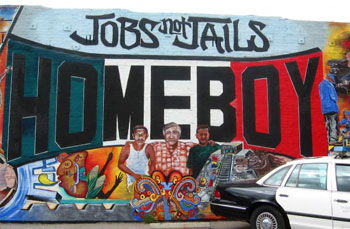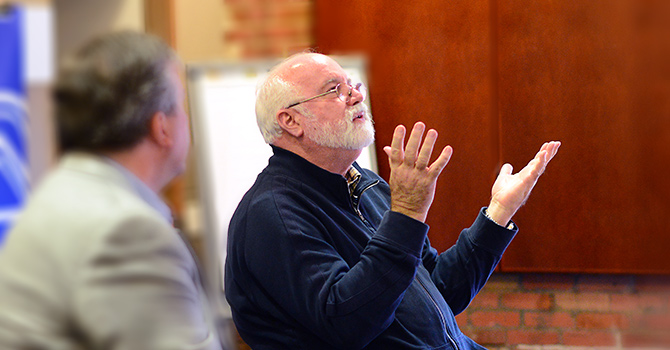From her kitchen window, she saw young adults gathering in the green space and recognized the danger.
For more than 20 years, this Latina immigrant had raised her family in one of the most violent neighborhoods in the gang capital of the United States, Los Angeles.
After years of community effort, gang violence had declined dramatically in her neighborhood. But out the window, she saw a sign that gangs were back in business, recruiting children in her complex.
This mother, unnamed because of the dangerous conditions in her community, asked for prayers from her Bible study group and her priest at Dolores Mission. The priest’s first response was to worship, to bring the visible presence of God into that green space through celebrating the Mass.
Within a few weeks, Dolores Mission organized a prayer walk from the mission grounds to the apartment. While there, the priest approached the gawking gang members and offered a blessing.
As an action-oriented, program-driven Protestant, I was completely taken aback by Dolores Mission’s first and nearly instinctive response: worship.
I was in Los Angeles to study a nationally known, comprehensive gang ministry that the Rev. Gregory Boyle, a Jesuit priest, began out of Dolores Mission in 1988 -- the subject of the recent book “Tattoos on the Heart: The Power of Boundless Compassion .”
Homeboy Industries includes a jobs program to provide tangible hope to gang-involved youth. In the wake of the 1992 riots that destroyed nearby sections of the city, Father Greg -- as he is affectionately called -- launched the first business owned by the ministry, Homeboy Bakery.
Today, a cluster of businesses employs hundreds of people who want to escape gangs.
Homeboy Industries provides job training, placement, counseling and education services to 13,000 gang members a year and hosts another 13,000 visitors who come to see how the work is done.
All of that was born of the worship focus at Dolores Mission, which draws 600 worshippers each week.
Dolores Mission is not just a typical congregation with a full program of activities. It organizes its outreach services in a particular way to achieve communitywide impact.
Rather than retaining the work of Homeboy Industries within the mission, Homeboy Industries is its own entity. Similarly, when the mission wanted to begin ministries to offer a meal and shelter to the homeless and to help the unemployed find jobs, it birthed and incubated independent entities with which the mission now partners.
By organizing the ministries in this way, the congregation is able to stay focused on worship, listening to the heart of God and the heart of the neighbor. The congregation embodies a community shaped by Christ.
Dolores Mission and Homeboy remain connected by leadership and disciplines.
The mission’s current priest, the Rev. Scott Santarosa, and Homeboy’s Father Greg live together in a Jesuit community.
Father Greg celebrates Mass at the mission every Wednesday. The mission’s emphasis on worship is replicated at Homeboy, with a gang member leading a daily devotion and prayer.
This relationship keeps the organizations productively intertwined, while allowing each to thrive in its own mission.
When congregations are effective at meeting deep human needs and want to make an impact at scale, they often decide to launch a separate institution.
Unfortunately, some of these institutions drift toward becoming exclusively human service agencies. Over time, the drift can cause a disconnect between the congregation’s mission and the independent institution.
One of the ways to test the connection between the mission and the work is to examine how congregations and their various ministries respond to deep need.
A congregation should ask itself, “What do we do first?” Dolores Mission prays and worships. Homeboy Industries prays and builds skills and relationships.
In Matthew 7, Jesus calls attention to the importance the foundation of a house being built: “Everyone then who hears these words of mine and acts on them will be like a wise man who built his house on rock. The rain fell, the floods came, and the winds blew and beat on that house, but it did not fall, because it had been founded on rock” (7:24-25 NRSV).
Dolores Mission’s first response to danger was to ask how the Christian tradition should shape its actions.
The mission’s leaders started with the heart of their practice. They worshipped in a way that welcomed God and those in their community who didn’t know God.
The history and habits of the people in this parish suggest that they will continue to think and live this way.
They will create whatever ministries are needed, born out of their traditions. They will look for whoever can partner with them. They will do so as people of hope, learned and lived in worship.














